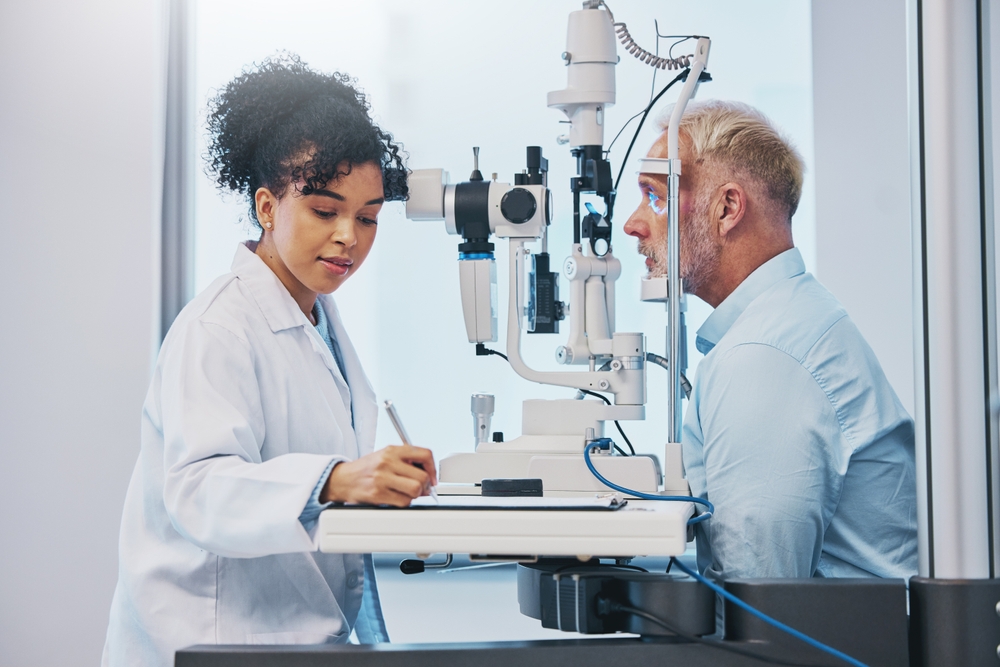You may be able to see well enough to drive, tell colors apart, read a menu, recognize faces, and perform other activities. But your eyes may reveal an underlying health condition you didn’t know you had.
Seeing your eye doctor for eye exams is necessary for keeping your eyes healthy, but they may also tell you new things about your health. Keep reading to learn more about what an eye doctor can tell you about your health.
Diagnose Health Problems in Early Stages

Many health conditions are asymptomatic, especially in their early stages. Although you may think you’re healthy, if you have an underlying health condition that has yet to be diagnosed, an eye exam could help save your life.
One of the hidden benefits of seeing your eye doctor for eye exams regularly is they may be able to point out warning signs of health issues in their early stages. Finding these health issues early on is the best-case scenario because treatment is usually the most effective.
By examining your eyes, your ophthalmologist can give you valuable insights into your overall health. Many health conditions are first diagnosed by an eye care professional. These may range from mild health conditions to life-threatening diseases.
Some of the medical conditions that an eye doctor may be able to reveal during an eye exam include:
Diabetes
Many people have diabetes and don’t even know it, which can lead to numerous complications. When you have diabetes, it can significantly impact your vision with certain conditions.
These include diabetic retinopathy, diabetic-related macular degeneration, early-onset cataracts, and glaucoma. If you have diabetes, there are certain signs that your eye doctor may be able to see by looking at your eyes.
One of these signs that they may be able to detect and see is slight bleeding in your retina. Diabetes poses a threat to your sight.
Fortunately, prompt detection and treatment can save your vision and prevent serious diabetes complications.
Heart Disease

If you have heart disease, your eye doctor may be able to detect the early signs of cardiac problems before you realize they are there. Your ophthalmologist may even be the first to recognize if you’re at an increased risk of having a stroke or heart attack.
Patterns in your retina can show if you’re more likely to develop cardiovascular conditions. If you have signs of heart disease, your eye doctor may request imaging or send you to a cardiologist. Spotting early signs of heart disease in patients can help save lives.
Certain Cancers and Tumors
Your eye doctor may find signs of tissue, blood, skin cancers, and certain tumors. Skin cancers like basal cells, melanoma, and squamous cells are common cancers that an ophthalmologist can detect.
An eye doctor can also find signs of leukemia and lymphoma affecting internal eye structures. Brain and breast tumors can spread to internal structures in the eye, allowing your eye doctor to see them and diagnose them.
Autoimmune Conditions
Certain autoimmune conditions affect various parts of your body, including your eyes. These conditions may include lupus, rheumatoid arthritis, and multiple sclerosis, with the manifestation of symptoms shown in the eyes.
Your eye doctor may be able to diagnose and identify these autoimmune conditions if they see other signs like dry eye syndrome or uveitis or if they notice that your eyes have changed in appearance. By detecting autoimmune disorders early, you can receive better treatment and manage these conditions more effectively if you have them.
Thyroid Conditions and Disorders
If you have a thyroid condition or disorder like hypothyroidism or hyperthyroidism, it may be something your eye doctor can detect. An autoimmune thyroid condition like Graves’ disease can cause your eyes to bulge.
If your eye doctor notices this or other signs, they may tell you to undergo further testing to determine if you have a thyroid condition and to receive proper treatment to manage these disorders.
Neurological Disorders

Are you experiencing symptoms like double vision, changes to your vision, or involuntary eye movements? Your eye doctor may suggest receiving testing for neurological disorders like multiple sclerosis or Parkinson’s disease.
Knowing that you’re experiencing these symptoms can aid in diagnosing and managing these neurological disorders if you have them.
Connective Tissue Conditions
Autoimmune conditions can go beyond diagnoses of lupus and rheumatoid arthritis. Your eye doctor may be able to diagnose early signs of connective tissue conditions like Sjogren’s syndrome, systemic sclerosis, and mixed connective tissue disease, which can all impact your eyes.
In their early stages, you may suffer from inflamed tear glands, dry eyes, or scleritis.
Blood Disorders that Affect Blood Flow to the Retina
Certain blood and clotting disorders can affect how blood flows to the retina. These conditions may lead to artery or retinal vein occlusions, which an eye doctor can diagnose and detect during an eye exam.
Early detection of these is imperative to prevent vision loss and manage any underlying blood disorders if they are found.
Infectious Diseases
Infectious diseases like Lyme disease may seem like they are only diagnosed by seeing a visible tick bite, but your eye doctor may see early symptoms. These can include swelling of the optic nerve, conjunctivitis, and uveitis. Early identification and diagnosis lead to earlier treatment, which is crucial for these diseases.
Make Your Eyes a Priority
There’s never been a better time to prioritize your eyes than now. Start by making an appointment at Evergreen Eye Center now! You only get one set of eyes, so isn’t it time to love them back for letting you see the beauty the world has to offer?

